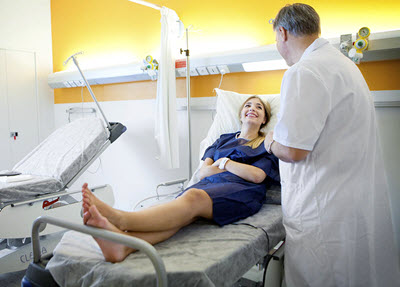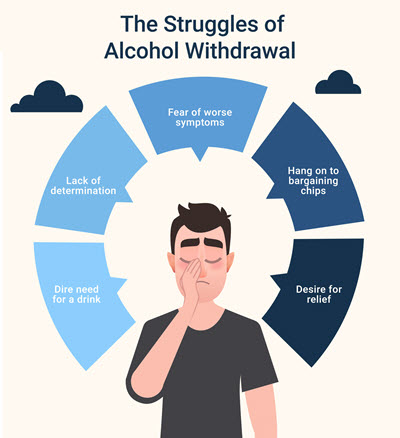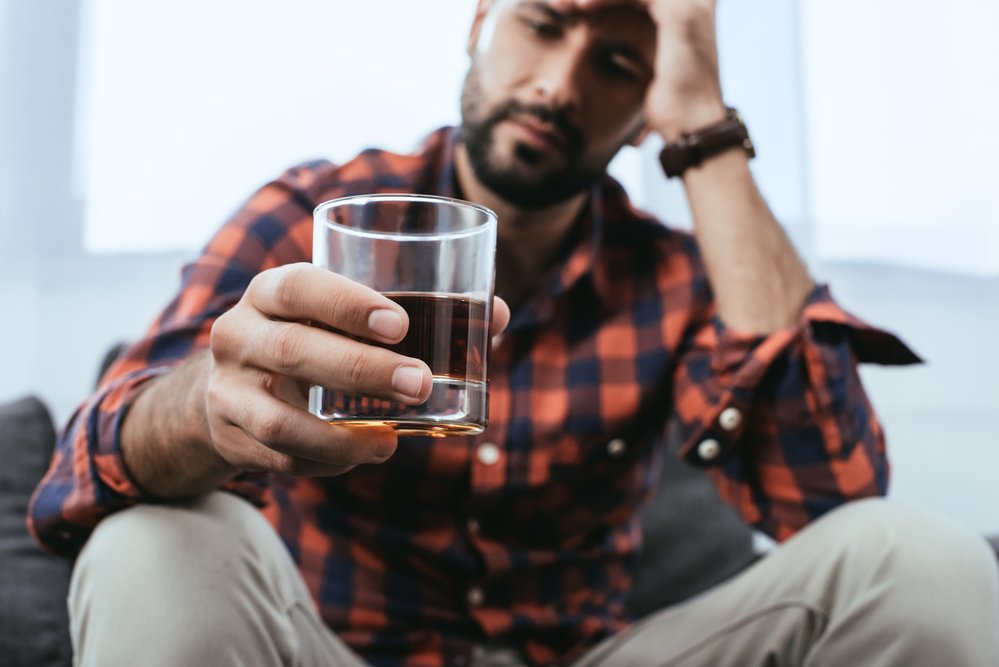
Alcohol abuse is common in the United States and it is treatable. A variety of alcohol rehabs, addiction treatment programs, and aftercare services are provided to help individuals discover an alcohol rehab program that is finest for them. If you have developed an alcohol addiction, comprehending your choices for treatment is very important. Alcohol rehab centers can use you the medical attention and assistance you require to pursue and preserve sobriety. Schedule an appointment for a thorough alcohol evaluation with our patient service assistant at 800-484-0393.
What is an Alcohol Rehab Center?
People with more severe alcohol addiction, a dual diagnosis, considerable medical issues, or previous complicated withdrawal experiences might benefit more from an alcoholism treatment program in an alcohol rehab center.2 Alcohol rehab programs offer clients with a steady, structured environment where they get 24/7 treatment and support.
Alcohol treatment facilities allow clients to get care from a medical staff as they get treatment for their alcohol use disorder (AUD). Many people gain from inpatient treatment since they are separated from the triggers that result in them drinking and can focus solely on their recovery. Although some treatment facilities are not alcohol just rehab centers, they do specialize in rehab from alcohol addiction and offer a choice of private residential setting or outpatient treatment services.
When To Look for Treatment?
Prior to starting the treatment procedure, a person should first acknowledge their condition and have a desire to stop drinking. Sometimes, an individual may acknowledge they have a drinking problem by themselves. Other times, relative or pals might stage an alcohol intervention. This involves liked ones expressing their concerns about the person's extreme drinking patterns. An intervention also assists to begin the conversation about treatment and support choices that are available.
Some alcohol addiction indication family members and friends might expect are:
- Frequent binge drinking
- Perpetual shifts in state of mind
- Poor efficiency at work or school
- Excuses for neglecting obligations
- Rejection of excessive alcohol usage
- Acts of violence or criminal offense
- Reduced interest in hobbies
There is no right or incorrect time to look for treatment for an AUD. However, if left neglected, alcoholism can set off a vast array of additional problems such as health complications, financial troubles, relationship concerns and expert disruptions. The earlier you or a loved one gets help, the higher the chance for lasting sobriety.
If you or a loved one needs help finding an alcohol treatment center call us today: 800-484-0393.
Types Of Treatment For Alcohol addiction
Choosing to get help for alcohol addiction is among the biggest decisions a person will make in their life. Prior to beginning treatment, you need to understand the numerous services each program offers. For instance, a detailed program focuses on the person as a whole, rather than simply their alcohol usage.
Many comprehensive treatment programs utilize numerous or all of these aspects:
Alcohol Detox
Detoxification is the initial action in treating alcoholism, and it can likewise be the most challenging. Within the very first couple of days after you quit drinking, you may experience very unpleasant withdrawal symptoms. Due to the fact that of this, the alcohol detox stage should only be finished under professional treatment. Treatment specialists will also have the ability to supply you with medication to help reduce the pain. This enables you to concentrate on improving. After detox, you will be able to move on with other forms of treatment and treatment.
Inpatient Rehab
An inpatient rehab center is the most structured treatment environment for those overcoming alcohol addiction. Normally, these rehabilitations are geared toward dealing with the most extreme kinds of alcohol addiction and need people to stay on-site throughout of the program-- 30, 60 or 90 days. Treatment specialists provide 24/7 care and will prepare you for life after rehab. This might include information on how to get rid of triggers, the importance of sobriety maintenance programs and what to do in the event of a relapse.
Alcohol Counseling
Frequent meetings with an alcohol counselor are important for individuals to communicate and receive assistance throughout their healing. Therapy opens a line of interaction during the great times, as well as the challenging times. Your therapist will also be able to deal with you on any underlying concerns that might be activating your drinking problem such as peers, household relationships, work or other circumstances. This will give you a chance to get more information about yourself, in addition to how to keep your body healthy both inside and out.
Government Treatment
In the United States, there are many government-issued services and resources that can assist with alcohol addiction. One of the most common, the Substance Abuse and Mental Health Services Administration (SAMHSA), functions as an information hub and treatment recommendation service. In addition, more states are concentrating on inexpensive treatment options to ensure anyone who needs treatment receives aid. Unfortunately, with an increasing demand for alcoholism treatment services, many government-funded programs have wait lists and other requirements such as monetary and medical requirement.
Alcoholism and Age
Alcohol abuse is an issue for all ages. In reality, about 623,000 adolescents in between the ages of 12 and 17 years of ages had an AUD in 2015, and just about 5% of those who needed treatment received it.
Mental Health and Substance Abuse
Mental health can play a significant function in substance abuse and treatment. Numerous clients are not just dealing with alcohol addiction however are likewise handling dual diagnosis or co-occurring disorders where a mental health issue occurs at the same time as alcohol abuse.4 The combination of mental health and dependency issues are identified as co-occurring conditions.4 Either condition may occur first and the mix of the 2 can need additional time in treatment to guarantee that both are resolved and dealt with successfully.
Length of Rehabilitation Treatment
An alcohol rehab does not have a set amount of time because treatment depends upon the person. While treatment might last from 28 to 90 days, it must last no fewer than 7 to 10 days. Each client's addiction and recovery is special and it must last as long as is essential for the private to get the required care and assistance to pursue recovery.
Partial Hospitalization Programs

Partial hospitalization programs (PHPs), likewise in some cases called day treatment programs, are addiction treatment programs that provide a high level of care however permit patients to live at home throughout treatment.7 PHPs use treatment that is similar to that of inpatient/residential programs.7,8 While programs differ, patients usually participate in treatment at least 5 days a week for between 4-6 hours every day.7,8.
PHPs offer services similar to a residential inpatient program, consisting of access to psychological healthcare services, if needed.7 Solutions offered through PHPs may include:
- One-on-one therapy.
- Group treatment.
- Household meetings.
- Medication management.
- Drug screening.
- Medical services.
Treatment of co-occurring mental health disorders.
Partial hospitalization might be best for individuals who need extensive care but have a strong support group beyond treatment that will help them stay sober. In addition, it might be an excellent suitable for individuals who are struggling to continue treatment, are at risk of relapse, or have a co-occurring disorder (e.g., depression or PTSD).
What Occurs in an Alcohol Addiction Treatment Program?
When it concerns treatment for an alcohol use disorder (AUD), detox is the initial step.
What Is Alcohol Detox?
Alcohol detox involves medical management of alcohol withdrawal symptoms while the body eliminates alcohol from its system. Given that alcohol withdrawal can potentially be fatal, due to grand mal seizures, the treatment group will utilize detox medications, such as benzodiazepines (Valium, Librium, and so on), to guarantee your security during withdrawal.2.
When you accomplish a medically stable, alcohol-free state, the treatment group will prepare you to shift into an extensive alcohol addiction treatment program. Detox is extremely effective and useful for someone looking to quit drinking, it isn't a replacement for rehab.2.
Alcohol Treatment after Detox

After detox, you will start treatment in a proper rehab setting for you. Inpatient treatment can take place in a number of various program varieties, such as luxury, executive, standard, holistic, faith-based, and so on.
It is necessary that you communicate with your detox team about the kinds of services and amenities you choose so that you can find a program that's finest matched for you. Regardless of the type of program, a lot of inpatient treatment will consist of:.
- Private treatment.
- Group counseling.
- Family therapy.
- Medication, if relevant.
- Peer assistance meetings.
- Aftercare preparation.
Specific therapy typically involves learning to acknowledge and manage stress factors and drinking triggers so that you can avoid regression in the long run.
The therapist will resolve the underlying issues that drive your alcohol abuse and teach you to make healthier choices. In group treatment, a licensed mental health counselor helps with a session in which patients find out sober social skills and can practice the relapse prevention and coping techniques they learn in individual counseling.
Alcoholism Treatment Medications

When it pertains to rehabilitation for those aiming to recuperate from alcohol use disorder (AUD), detox is often the primary step while doing so. Going through withdrawal from alcohol may be extremely uneasy or potentially hazardous, so certain medications may be prescribed to manage pain, stop or minimize the development of aggravating symptoms, and lower the opportunity of further withdrawal issues.10.
Beyond medically supervised detox, there are medications that have been approved by the FDA to treat alcohol addiction and alcoholism. A few of the medications recommended during the recovery process include:.
Disulfram: This medication (likewise known as Antabuse) is utilized to motivate abstinence from alcohol. Disulfiram interferes with the method the body breaks down (metabolizes) alcohol. When someone on Disulfiram drinks even a small amount of alcohol, they may experience undesirable impacts. These results might prevent the individual from drinking.
Naltrexone: This medication is created to reduce and suppress cravings for alcohol (along with opioids). Naltrexone obstructs the results of alcohol, specifically the "high" sensation that inspires individuals to continue drinking.
Acamprosate: This medication (frequently recognized as Campral) assists the brains of individuals who have imbibed large amounts of alcohol to function typically again. Acamprosate brings back a balance in the central nervous system.
What Length Of Time Does Alcohol Rehab Take?
Alcohol rehab centers supply an environment free from the outdoors triggers and temptations to consume, which can be extremely essential for some people in early recovery. Treatment regularly takes place over durations of 28-30, 60, or 90 days. For more details on rehabilitation programs by length, you can see the following guides.
- 30 rehab programs.
- 60 day rehab programs.
- 90 day rehab programs.
Longer stays can be accommodated, if essential. Treatment duration varies depending upon an individual's needs. It is necessary to find a treatment center that develops a treatment strategy based on your special circumstance and addiction.
Research has shown that the majority of people handling substance use require to be in treatment a minimum of 3 months to minimize or stop their alcohol use; longer participation in treatment often brings the very best outcomes.
How to Find the very best Inpatient Alcohol Rehab Center Near Me?
If you're wishing to find the very best inpatient rehab center for alcohol addiction near you, it's important to carefully consider the various kinds of treatment programs available to ensure your needs are satisfied. The best and most efficient treatment is that which is customized to your individual needs, whether it's brief- or long-term, residential inpatient, outpatient or dual diagnosis programs.
Depending upon your place, you might find there is not an appropriate treatment program in your location. If there are programs neighboring for alcoholism, consider the pros and cons of being admitted to a regional program versus taking a trip out of State. Our rehab directory can help you explore treatment facilities throughout the United States. Some popular States consist of California, New Jersey, Florida and Texas.
How to Select an Alcohol Rehab Program
Learning as much as you can about these kinds of dependency treatment centers can assist make the decision to get in and, eventually, the transition into rehab simpler. Everyone is unique in their needs regarding alcohol abuse and mental health conditions, so not every treatment program is ideal for everybody. There are countless treatment programs throughout the country, and you need to consider lots of aspects when selecting the ideal one for you.
In picking a rehab program, numerous aspects require to be thought about, such as:.
- Cost
- Location
- Facilities
- Insurance coverage accepted
- Levels of care available/intensity of treatment
Find a High-end Luxury Alcohol Rehab
If workplace commitments and other expert concerns have actually stopped you or a loved one from getting assistance for alcohol abuse, executive rehab programs may be what's required.
Executive rehab centers are designed to enable you to continue working while looking for recovery from alcohol addiction. These programs provide you access to private workrooms, high-speed Internet, mobile phone, and computers.
Do Features Matter?
Recovery Brands collected data in 2016 that asked people leaving a dependency rehab facility what center attributes they saw as high concern things to analyze when looking at treatment programs.
The premier concern was the program's monetary policies, like financial backing, payment alternatives, and insurance coverage accepted.
They also placed a high importance on the program's offerings (facility housing, leisure, food quality, etc) a lot more upon leaving treatment. Those considering treatment will wish to examine a center's monetary policies in addition to program offerings to notify their last facility option.
Information Needed for Alcohol Treatment Facilities
When you call our helpline, you'll want to have as much pertinent details as possible so that you can properly answer the admissions navigator's questions. Examples of information you may need to provide include:
Questions to Ask Alcohol Rehab Centers.
If you'd choose to do your own research, you'll want to call around to various facilities. Prior to you call a treatment center, you'll want to create a list of concerns to inquire to guarantee that they are a match for you.
Some typical questions you'll wish to think about include:
- What type of insurance do you accept?
- What is your treatment viewpoint?
- How long is your program?
- What kinds of facilities do you have?
- What kinds of therapy do you use?
- Do you supply healthcare?
- What accreditations do your team member have?
- Is your rehab accredited?
- Do you offer medications to treat alcohol addiction (e.g., suboxone, naltrexone, disulfiram, acamprosate)?
- Do you provide any grants or scholarships?
- What is your visitor policy?
- Do you provide medical detox?
- Do you develop customized treatment plans?
- Do you create aftercare plans.
- Do you use Alcoholics Anonymous meetings?
- Do you have an alumni program?
You will also want to have your insurance coverage card in front of you so that you can inspect if they take your insurance coverage. If you do not have insurance coverage, it is necessary to ask what kind of sliding scale or financing choices the alcohol rehab offers.
Does Medical Insurance Cover Alcohol Rehab Treatment?
Health insurance usually covers alcohol rehab-- either completely or partially-- for individuals. That's because addiction is an illness and requires medical treatment in the very same method that cardiovascular disease or cancer requires treatment. Nevertheless, different factors influence the amount and type of coverage each insurance strategy offers alcohol addiction treatment. Find out more about your particular coverage and alternatives here.
For rehab services not included in insurance coverage, personal pay and individual loans can assist cover spaces, making treatment more economically practical for those in need of care.
Finding Your Ideal Alcohol Treatment Program
If you are seeking an alcoholism treatment program, you need to try and choose exactly what you want to leave it. One crucial decision is where you will attend your rehab. Many people pick to attend rehab at a local center in order to stay near home with household close by. Others may wish to avoid the triggers around them in the house and start fresh by themselves. Whatever accomplishes your treatment goals is most important.
Alcohol Addiction Aftercare
Healing doesn't end when rehab ends; it is a continuous procedure. As you reach the end of your treatment program, your treatment team will create an aftercare plan for you. Aftercare includes continuous support and healing efforts that can help you remain sober.
Examples of aftercare services include sober living homes, step-down treatment, such as partial hospitalization or intensive outpatient, individual therapy, group therapy, Twelve step programs (AA), non-12-step programs, and alumni programs.
Just like your treatment plan, your aftercare strategy will be extremely individualized and might consist of any mix of the above services. Devoting to long-term healing will help you avoid regression even years after participating in treatment.
Alcohol Usage Statistics
Alcoholism affects people all throughout the United States. A 2015 survey revealed that about 86% of people ages 18 or older have actually consumed alcohol at some point in their lives, and an approximated 15 million people in this same age group meet the requirements for alcohol addiction-- identified as an alcohol use disorder (AUD). Persistent alcohol abuse can have detrimental and even fatal outcomes.
Roughly 88,000 people pass away from alcohol-related causes each year.1 These deaths are extremely preventable. If you or someone you understand struggles with alcohol addiction, detox and rehab can assist you on the roadway to a tidy and healthy life.
Rehab for dependency might include either inpatient or outpatient treatment. Outpatient treatment is most suitable for individuals who have a mild to moderate dependency, strong social supports, and dependable transportation to the center.
Healing From Alcohol Addiction
It is important to declare aspects of your life that were neglected by your drinking. You can hang out with your family and get new pastimes that will assist you construct a life without alcohol.
No matter what, you require to know that it is never far too late to get control of your dependency. Recovery from alcohol addiction could be the most important thing you carry out in your life.
Find Treatment
It’s simple and easy – and you can do it. Just pick up the phone and speak to one of our counselors about your rehab treatment options. (800) 484-0393
Alcohol Treatment Facilities
Alcohol Detox
How Long Does Alcohol Detox Take?
Inpatient Alcohol Rehab
The Benefits Of Inpatient Rehab
Outpatient Rehab
The Benefits Of Outpatient Rehab
Alcohol Counseling
Inpatient Vs. Outpatient Treatment
The Cost Of Alcohol Rehab
Government Treatment For Alcoholism
Medicare
Scholarships And Grants For Alcohol Rehab
Types Of Therapy For Alcoholism
Medicaid
Life After Alcohol Rehab
Returning To Work After Rehab
Alcohol Treatment Medications
Acamprosate
Benzodiazepines
Disulfiram
Naltrexone
Alcohol And Fitness
Faith-Based Treatment
Teen Alcohol Rehab
Questions About Rehab
How Do I Pay For Rehab?
How Do I Know If I Need Help?
Should I Go Back To Rehab?
Is My Addiction Bad Enough?
What Is A Typical Day In Alcohol Rehab Like?